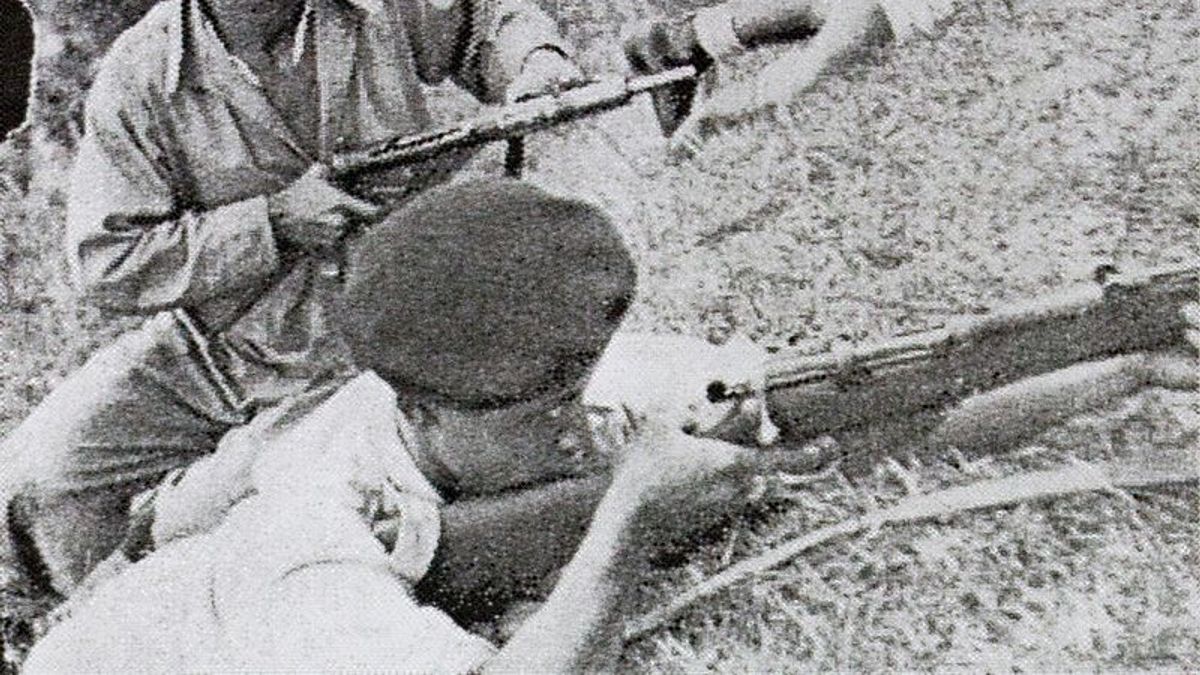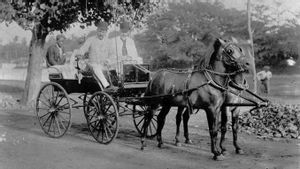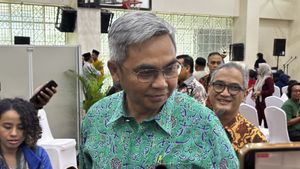JAKARTA - Usmar Ismail's struggle spawned the film Blood and Prayer (1950) full of struggles. The film was made with limited facilities and talents, so that it became a milestone in the history of national cinema.
Moreover, Usmar had to play many roles. He not only acts as a director, but Usmar also plays a role as a screenwriter, driver, and porter. The totality was done for the sake of the name of the nation. The spell was successful. The film Blood and Prayer was praised by a wide audience, including Soekarno. Therefore, Usmar is nicknamed the Father of National Film.
Since childhood, Usmar has been interested in the world of films. His enthusiasm for watching movies is very high. Usmar watched everything carefully. He understands that talking about films is not just stories. He pays attention to image quality, camera placement, to the music.
According to Usmar, music is an important and vital element for a film. In silent movies, especially. He is always looking for a way to get a narration from a movie he hasn't seen. He would go to his brother and sister-in-law to seek answers. One of the first things Usmar will definitely be asked about: piano playing. Alias, someone who accompanies the silent film music.

Whenever he has free time, Usmar always makes time to watch. The mission is clear. He wanted to get the full picture of the film. Everything was then well prepared by Usmar. He always buys a ticket that puts him in the front row. So that you can see clearly. Even so that you can clearly be near the piano player.
This activity became more frequent when he continued his education at Algemeene Middelbare School (AMS-A II), Yogyakarta. Usmar also began to be avid film. It was his love for films that paved the way for his love of art. He is also active in participating in theater groups to hone his acting skills.
“Usmar's accompanist is a musician who carefully accompanies scene after scene in a silent film. The gameplay is adapted to the dynamics of the scenes on the screen. So the piano player became an important element for cinema at that time. In the memory of Usmar's nephew, Alwi Dahlan, since childhood, Usmar has been interested in various elements of the film."
"Not enough to follow the story, he likes to investigate how the piano player accompanies the film and observe the symbols that appear in the film. Every now and then, if Usmar went to the cinema, he could be sure he would choose the front seat, close to the screen and the piano player. So, since junior high school, he has been thinking about films that are full of symbols," said Alwi Dahlan as written by Ancestor Cinta Dewi Merdeka in Tempo Magazine entitled Usmar Ismail, Film, and Kita (2021).
Blood and Prayer Film ProductionUsmar Ismail's path gave birth to his own works. He also became part of the Dutch production company, South Film Festival. Usmar is also involved in two films from the company. The first film was titled Harta Karoen (1949). A film based on Tonil Si Bachil by Moliere. While the second film is Tjitra (1949). The film is based on a play he wrote himself in 1943.
The film was successful in the market. The making is no joke. Both films were produced with equipment that was quite capable in their time. Usmar did not consider this convenience. He felt the two films did not belong to him emotionally.
This feeling was present because Usmar felt that he was being dictated to by many parties. Even many of Usmar's ideas were not approved. Usmar chose not to acknowledge the two films as the first and second films.
At that point, Usmar had the intention of making his own first film. Alias without being dictated by many parties. He also promoted a film project entitled Blood and Prayer. The film with the theme of the struggle for independence from the writer Sitor Situmorang's idea became his teaching. Usmar was free to express his ideas. He not only acts as a director, but also doubles as a screenwriter, driver, and so on.

Obstacles did not last long. Usmar only has Rp. 30,000 in cash. That was the severance pay he received after being released from the army. After all, the average production cost of one film at that time reached Rp. 100 thousand. The usual lack of production did not make Usmar's spirit fade.
He is still moving to continue his film. His friend and historian, Rosihan Anwar, shared the hardships experienced by Usmar in 1950. Usmar was lucky. On his way, Usmar received an additional injection of funds. Rosihan Anwar said the injection of funds came from a financier named Meester in de Rechten (Mr) Liem. The total of Blood and Prayer was completed with a production cost of Rp. 350 thousand, therefore.
"From this experience, Usmar learned the harsh reality of the film world, namely with idealism alone it is impossible to solve and overcome all problems, but it is possible to solve and overcome all problems, but also requires a dose of realism that there must be an attitude of compromise with the investors."
“And indeed Usmar then to some extent cooperated with the investors. While trying to stick to the spirit of idealism, “explained Rosihan Anwar in the book History of Small 'Petite Histoire' Indonesia Volume 2 (2009).
The presence of the film Blood and Prayer also describes a lot of history. The film became the first Indonesian film that was completely completed by the nation's children. Many admired the film. Soekarno, one of them. As a result, praise was pouring out to Usmar Ismail.
As a form of appreciation, the Indonesian government then took part in making the first filming of Blood and Prayer, March 30, 1950, as National Film Day. Usmar Ismail also got a nickname. He is dubbed as the father of national cinema by all Indonesian people.
“One of the films that made him very famous was Blood and Prayer. This film was shot for the first time on March 30, 1950. This first shot was later used as a film day in Indonesia. This is because this film is the first film produced by a native Indonesian and has an Indonesian character or identity.”
“This film is not intended for commercialization and is not a propaganda tool like during the Japanese era. It means, this film is a project of the idealism of the nation's children to display their national ideas in an original Indonesian film," concluded Dwi Susanto and Bagus Kurniawan in the book Islam, Literature, and Language Discourse (2021).
Such was Usmar Ismail's long journey as part of the history of national cinema, that March 30 was designated as national film day.
The English, Chinese, Japanese, Arabic, and French versions are automatically generated by the AI. So there may still be inaccuracies in translating, please always see Indonesian as our main language. (system supported by DigitalSiber.id)









